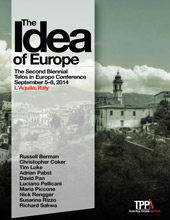It seems that a young internet highflier who calls himself “the Argonaut,” whose idée fixe is the future of the European Union, has become the champion of a possible Federalist European Union and is bombarding the network with a number of miracles that, according to him, are being achieved in Brussels and Strasbourg. He claims that Europe’s political unification is fully realized, that the ECB has extended quantitative easing to all European banks, that the Greek problem, he happily announces, is solved thanks to a giant issue of fifty-year Greek government real estate bonds, which are sending the international financial market agog. The EU Commission, the Argonaut dreams, has decided to support the British suggestion that the EU MPs should work inside various 28 national parliaments, thus integrating the European institutions, and not in Strasbourg; he moreover says that the Frontex Immigrant Agency in Warsaw, duly instructed by Germany, has accepted enthusiastically to coordinate the Mediterranean immigrants distribution among the EU member states who heartedly agree. His most fantastic declaration is that five EU defense ministers of Germany, France, Italy, Spain, and Great Britain, based on articles 28, 42, and 43 of the Lisbon Treaty, have created the EEF, an European Expeditionary Force, which will be based in Sardinia and near Cracow. Special arrangements, he candidly assures the social network, have already been signed with NATO.
|
On The Agenda with Steve Paikin, Telos Associate Editor Adrian Pabst and others discuss the transformation of Germany since the Fall of the Berlin Wall, which took place twenty-five years ago this month, as well as Germany’s future as a dominant political and economic force in Europe. Speaking at the 2014 Telos in Europe Conference, Neil Turnbull considers the prospects for the European project as we move from the Westphalian age of nation-states to a new age of empires. What kind of empire is now emerging in Europe, and what form will it take in the future? In this video from the 2014 Telos in Europe Conference, Susanna Rizzo discusses her work on the complex history of the idea of Europe, how it has been shaped by discourses about place and the other, and then considers what the future will be for an increasingly pluralized Europe in which the notion of European identity has been reformulated. |
||||
|
Telos Press Publishing · PO Box 811 · Candor, NY 13743 · Phone: 212-228-6479 Privacy Policy · Data Protection Copyright © 2025 Telos Press Publishing · All Rights Reserved |
||||
 I thank very much the organizers for this opportunity to discuss “The Idea of Europe.” Among the several specific topics for discussion suggested in the conference outline, my paper will address the question: “Universalism or exceptionalism?” Now, in the context of this conference, this question might be understood either in historical-political or in philosophical terms, or somehow in both. And it is my contention that, in “the Idea of Europe” the historical-political and the philosophical as such substantially converge. In other words, in “the idea,” with its philosophical complexities, we should be able to find the trace of the decisive rupture in historical time—event, exception—that gave rise to modern Europe and conferred a particular direction, a primordial bias to its temporal unfolding; a bias not opposed to modern reason’s universalism, and inherently beyond the reach of its critical powers.
I thank very much the organizers for this opportunity to discuss “The Idea of Europe.” Among the several specific topics for discussion suggested in the conference outline, my paper will address the question: “Universalism or exceptionalism?” Now, in the context of this conference, this question might be understood either in historical-political or in philosophical terms, or somehow in both. And it is my contention that, in “the Idea of Europe” the historical-political and the philosophical as such substantially converge. In other words, in “the idea,” with its philosophical complexities, we should be able to find the trace of the decisive rupture in historical time—event, exception—that gave rise to modern Europe and conferred a particular direction, a primordial bias to its temporal unfolding; a bias not opposed to modern reason’s universalism, and inherently beyond the reach of its critical powers. 

